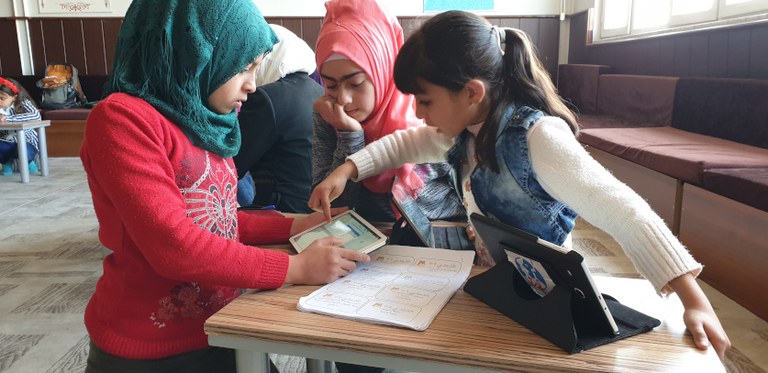Over 8 years of war; for 10 years old children, it means that’s the only thing they have known in their entire life. The majority of them are orphans; they left Syria to seek refuge in neighbouring countries and to start - or at least trying to start- a new life. Everything is new: country, culture, language and habits. Especially for children, this is not an easy task, considering the memories from their past that remain inevitably indelible in their minds, with physical and psychological consequences on them and on their learning process. TSF mLearning activities are helping Syrian refugee children in their recovery process through a tailored and dedicated approach based on digital and innovative tools.
Harnessing the potential of digital technologies to offer them a present on which to build their future…
While TSF activities cannot give them back their past, or remove from their minds the atrocities years of conflict forced them to see, they are giving them a present, and a future.
A present in which digital resources like tablets and robots are an enhancing and empowering instrument, along many other manual tools, to support their learning experience based on chlidren’s own choice and needs.
A present in which technologies help them regain control of their lives. Where a simple Scratch exercise becomes an opportunity to learn the basics of programming, but also to express their creativity, be it through an horse, an animal farm, a scuba diver or an astronaut ready to land on the moon. The possibility to add their own imagination to the exercise, recording their voice, including unrealistic but colourful features to the characters of their stories, becomes a way for them to finally own something, after having been for years at the mercy of others.

And when the challenge is completed, an important moment comes. The satisfaction of getting up, going to the board, taking a smiley sticker, finding the right cell at the intersection between their name and the challenge they just completed, and sticking the smiley face, which mirrors their own while giving a five to their mates, with whom they collaborated to get there.
…through an innovative, dedicated approach
Children scattered around the room in small groups, some absorbed by interactive videos on Arabic, Science or Maths, some others fully focused on their evaluation papers. Some seem to be playing with toothpicks, or with small coloured bricks, some others with robots. Amazing to find out a few minutes later, that they are not just playing, they are actually learning Maths or programming through manual tools specifically adapted to help them learn in the engaging way they need.
The mLearning activities offer these children a present, where they have access not only to a vast array of online and offline resources specifically selected to meet their needs, but also where they can progress at their own pace thanks to the skills belts system. Where technologies are not just a standalone tool, but an integral part of a more complex and tailored educational approach. An approach that helps them grow, no matter if they have never attended school, or if their education had been interrupted due to the conflict and they are thus now obliged to work.
This is why you’ll see children constantly moving around from one table to another, asking and helping each other to solve a problem. With this kind of approach, the children can decide the resources they prefer to use based on their learning style. In this way they progress in an autonomous while guided manner; all of this in an incredibly quiet atmosphere.
Through such a peculiar approach, founded on children’s needs and encouraging them to become independent, autonomous, active learners, TSF is equipping them with a cornerstone on which to build their future. A stone that won’t cover their past, but that is giving them the means to start regaining control over their lives.








